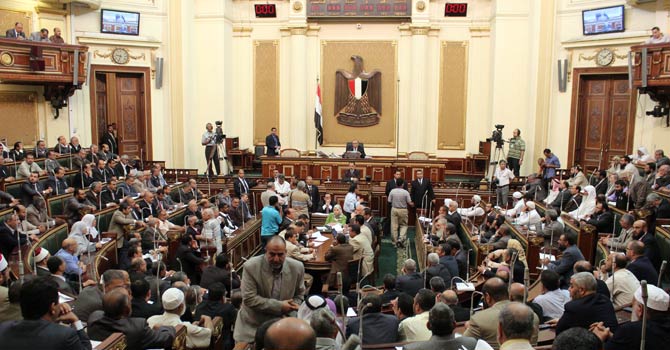
(AFP File Photo)
The committee tasked with amending the Political Participation Law and the Parliamentary Elections Law finalised the draft of the latter legislation on Wednesday.
Interim President Adly Mansour issued a presidential decree on 14 April creating the said committee to amend the laws in preparation for the coming parliamentary elections. The committee is headed by Mohamed Amin El-Mahdy, Minister of Transitional Justice and House of Representatives.
According to the draft law, the parliament will be comprised of 600 seats; the president can appoint a maximum of 30 members. Three quarters (480) of the seats will be elected individually, while the remaining 120 seats will be elected through electoral lists.
Candidates from different parties and independent candidates can be part of the same electoral list. An electoral list can be comprised only of independent candidates.
Article 24 of the draft law states that for individual seat elections, the candidate who acquires the absolute majority of correct votes wins the seat. If there is no absolute majority, re-elections are held. The number of candidates in this case is double the number of seats.
In list elections, the winning list is the one which garners an absolute majority. In case there is none, re-elections are held between the two lists which have the largest number of votes.
Article 25 lists the rules in the case that only one person or one list runs within one electoral district. If the single candidate running for an individual seat gains 5% of the votes, he or she wins. If they gain less than 5%, re-elections are held and the candidate wins with any number of votes. The same rules are applied to lists, if only one list runs in an electoral district.
The president has the right to appoint members as parliamentarians, with a percentage that does not exceed 5% for the purpose of strengthening the “representation of experts”, namely people with scientific and practical accomplishments. Out of a council of 600, this could mean up to 30 appointees.
Article 28 stipulates a number of regulations that the appointees must meet, which include: the president does not appoint someone who belongs to a party the president belonged to before heading the state; the president does not appoint partisan candidates from one party in a manner that affects the majority in parliament; and that the president does not appoint a candidate who ran for a seat and lost in the same legislative term.
As stipulated in Article 8 of the draft law, candidates must be at least 25 years old when the window to apply for candidacy opens. Article 11 states that a candidate must have at least completed basic education. People who belong to the military, police, intelligence, the Administrative Control Authority, as well judicial bodies, ministers and governors cannot run for a seat before resigning from their posts.
A candidate can only run in their electoral district. A candidate is also prohibited from running on both a list and an individual seat.
The draft law creates quotas for different minorities, to be applied during the coming parliamentary elections only. Each electoral list should include: at least three females, at least three Copts, at least two farmers and/or labourers, at least two youth members, at least one handicapped member and at least one member from Egypt’s expatriates.
The 2014 Constitution includes transitional articles, articles 243 and 244, which oblige the state to “adequately” represent youth, Christians, the disabled, Egyptian expatriates, farmers and labourers in the coming parliament in a manner to be organised by the law. The Constituent Assembly, which drafted the constitution, nevertheless cancelled the 50% parliamentary quota allocated to farmers and labourers since the era of late President Gamal Abdel Nasser in the 1960s.
The legislation defines the farmer as someone whose only job and main source of income is farming for at least 10 years before his election. He should reside in the countryside and should own, alongside his wife and minor children, no more than 10 acres of land.
A worker is someone whose main source of income is “physical or mental” labour. Such candidate cannot be both a member of a professional union and a bearer of a university degree but must be a member of a labour union.
The youth, according to the legislation, are aged between 25 and 35 years old on the day of opening the floor for elections.
Someone who is handicapped is defined as one who is suffering from a disability which does not prevent them from exercising their civil and political rights. A medical report should be issued to distinguish a handicapped person, based on criteria established by the Supreme Electoral Commission.
Expatriates are defined as those “permanently” residing outside Egypt. They should either have a permanent residence or have lived abroad for at least 10 years before running for the elections.
Unless they are caught red-handed, the members of parliament cannot be charged with committing a crime or a misdemeanour without the parliament’s permission, according to Article 31 of the draft law.
Article 35 stipulates that a member of parliament’s monthly reward is tax-free and worth EGP 5,000. It adds that the sum of a member’s pay from parliament cannot exceed EGP 20,000 per month.
The activities of the committee which drafted the law were criticised by political parties for not being inclusive.
